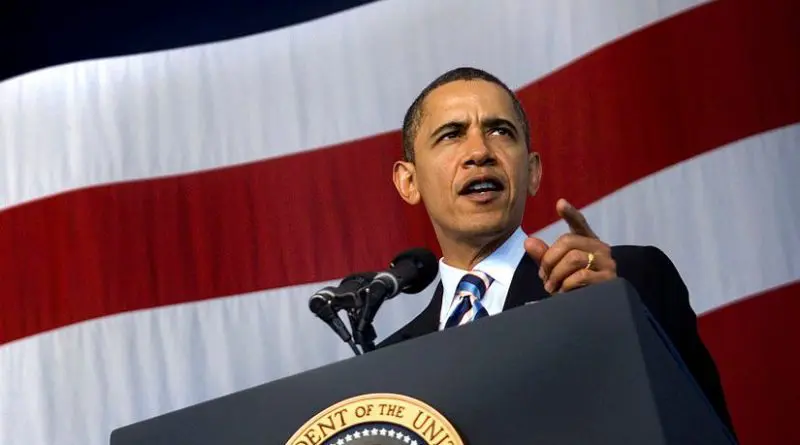Downside To Obama’s Arab Spring Ignored By White House – OpEd
By Jim Kouri
The Obama-perpetuated myth of an Arab Spring received a reality check when upper-echelon members of an Egyptian-based radical Muslim group met with elements of the deadly Palestinian terrorist network.
A high-level delegation of Egypt’s Muslim Brotherhood recently held a first-of-its-kind tour of the Gaza Strip, followed up by meetings with top Hamas officials held in Cairo, according to the Meir Amit Intelligence and Terrorism Center in Israel.
Both the Brotherhood and Hamas consider the improvement of their contacts a means of scoring political gains in Egypt and furthering their status and power: the Muslim Brotherhood would rule Egypt while supporting Hamas and other Palestinian terrorist groups such as the Army of Islam and the Salafists.
In late October 2011, a high-level delegation of the Muslim Brotherhood visited the Gaza Strip for the first time. Since the fall of the Mubarak regime, a number of earlier meetings were held in Cairo between top officials of the Egyptian Muslim Brotherhood and the Hamas leadership.
The Muslim Brotherhood, which has gained political legitimacy thanks to President Barack Obama and his U.S. State Department and secured a position of power in Egyptian politics, is now seeing a chance to solidify its contacts publicly made with Hamas, its Palestinian branch.
Advertisement
The Muslim Brotherhood’s relations with Hamas during the Mubarak regime needed to be kept to a bare minimum due to internal security considerations (the Mubarak regime had concerns about the possibility of the Hamas administration in the Gaza Strip exporting terrorism, subversion, and radical Islam to Egypt).
The solidification of public relations between the Muslim Brotherhood and Hamas is driven by mutual interests such as:
- The Muslim Brotherhood movement is interested in improving its status and image with the Egyptian regime and public. It does so by positioning itself as a movement that can help the regime advance its interests on the volatile Palestinian-Israeli scene while boosting its popularity with the Egyptian public, whose deep-rooted support for the Palestinians is well known to the Muslim Brotherhood. It may also be interested in using Hamas’ administrative experience as part of the process of integration into the Egyptian political system.
- In Hamas’ view, there are numerous advantages in solidifying its relations with the Muslim Brotherhood. First and foremost, it is a means of strengthening its position vis-à-vis the Egyptian army and administration with the purpose of gaining more power and making substantial gains, such as scaling down Egypt’s security activity against the tunnels that are vital for smuggling weapons into the Gaza Strip; receiving more consideration for the positions of Hamas vis-à-vis Fatah and the Palestinian Authority in the internal Palestinian dialogue (where Egypt plays the role of mediator); and alleviating pressure exerted by Egypt on Hamas with regard to its policy in the Gaza Strip while restraining Israel’s reactions to terrorist attacks launched from the Gaza Strip.
- Hamas is also interested in using its relations with the Muslim Brotherhood and the solidification of its status with the Egyptian government to improve its internal position vis-à-vis Fatah and the PA and strengthen its position in the Arab world (particularly in light of the growing difficulties in its relations with Syria).
- Despite the moderate image that the Muslim Brotherhood is trying to project both in Egypt and abroad (particularly to the Western world), when it comes to the Israeli-Palestinian conflict its top officials continue to publicly support the “resistance” (i.e., terrorism). In their statements and activities, they repeatedly voice unequivocal support for Hamas and other Palestinian terrorist organizations, calling on the Arab and Muslim world to help the Palestinian terrorist organizations (“resistance”) in the Gaza Strip with money, weapons, and equipment.
- The Muslim Brotherhood, including its branches in the Arab world and Europe, is involved in providing financial assistance to Hamas (through the Union of Good, headed by Sheikh Qaradawi). Cooperating with radical left-wing activists in the Western world, the movement’s activists play a major role in the anti-Israel delegitimization campaign.
The involvement of the Muslim Brotherhood and radical Islam activists is particularly evident in the flotilla campaign (the Mavi Marmara flotilla, for instance) and other activities, such as sending aid convoys to the Gaza Strip, initiating anti-Israel propaganda campaigns in Western countries, the BDS campaign to boycott Israel, and so forth.
Last year, U.S. Homeland Security Secretary Janet Napolitano and her senior staff secretly met with a select group of Muslim, Arab, and Sikh organizations. Among the mix were three organizations directly associated with an outlawed terrorist entity — the Muslim Brotherhood, who are involved in the current political transition in Egypt.
Walid Phares, director of the Future Terrorism Project at the Foundation for Defense of Democracies, criticized the partnership concept: “Through the so-called ‘partnership’ between the Jihadi-sympathizer networks and U.S. bureaucracies, the U.S. government is invaded by militant groups.”
Just recently, a Washington, DC-based legal group uncovered documents from the Department of Homeland Security that detail a two-day meeting on January 27 and 28, 2010, between DHS Secretary Janet Napolitano and Arab, Muslim, Sikh, and South Asian “community leaders.”
Judicial Watch reports they obtained documents that include a list of participating individuals and organizations in Napolitano’s meeting with individuals with controversial radical ties.

